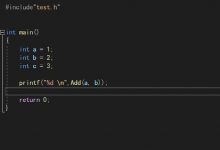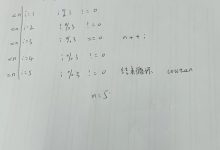C语言的字符串操作
1.strtok 实现字符串切割: 将字符串根据分隔符进行切割分片.
#include int main(int argc, char* argv[]){ char str[] = \"hello,lyshark,welcome\"; char *ptr;ptr = strtok(str, \",\"); while (ptr != NULL){ printf(\"切割元素: %s\\n\", ptr);ptr = strtok(NULL, \",\");}system(\"pause\"); return 0;}
2.strlen 获取字符串长度
#include int main(int argc, char* argv[]){ char Array[] = \"\\0hello\\nlyshark\"; char Str[] = { \'h\', \'e\', \'l\', \'l\', \'o\' }; int array_len = strlen(Array); printf(\"字符串的有效长度:%d\\n\", array_len); int str_len = strlen(Str); printf(\"字符串数组有效长度: %d\\n\", str_len);int index = 0; while (Str[index] != \'\\0\'){index++; printf(\"Str数组元素: %c --> 计数: %d \\n\", Str[index], index);}system(\"pause\"); return 0;}
3.strcpy 字符串拷贝:
#include #include #include int main(int argc, char* argv[]){ char Array[] = \"hello lyshark\"; char tmp[100]; // 学习strcpy函数的使用方式if (strcpy(tmp, Array) == NULL) printf(\"从Array拷贝到tmp失败\\n\"); elseprintf(\"拷贝后打印: %s\\n\", tmp); // 清空tmp数组的两种方式for (unsigned int x = 0; x < strlen(tmp); x++)tmp[x] = \' \'; memset(tmp, 0, sizeof(tmp));// 学习strncpy函数的使用方式if (strncpy(tmp, Array, 3) == NULL) printf(\"从Array拷贝3个字符到tmp失败\\n\"); elseprintf(\"拷贝后打印: %s\\n\", tmp);system(\"pause\"); return 0;}
4.strcat字符串连接: 将由src指向的空终止字节串的副本追加到由dest指向的以空字节终止的字节串的末尾
#include #include #include int main(int argc, char* argv[]){ char str1[50] = \"hello \"; char str2[50] = \"lyshark!\"; char * str = strcat(str1, str2); printf(\"字符串连接: %s \\n\", str);str = strcat(str1, \" world\"); printf(\"字符串连接: %s \\n\", str);str = strncat(str1, str2, 3); printf(\"字符串连接: %s \\n\", str);system(\"pause\"); return 0;}
5.strcmp 字符串对比:
#include #include #include int Str_Cmp(const char * lhs, const char * rhs){ int ret = strcmp(lhs, rhs); if (ret == 0) return 1; elsereturn 0;}int main(int argc, char* argv[]){ char *str1 = \"hello lyshark\"; char *str2 = \"hello lyshark\"; int ret = Str_Cmp(str1, str2); printf(\"字符串是否相等: %d \\n\", ret); if (!strncmp(str1, str2, 3)) printf(\"两个字符串,前三位相等\");system(\"pause\"); return 0;}
6.strshr 字符串截取:
#include #include #include int main(int argc, char* argv[]){ const char str[] = \"hello ! lyshark\"; char *ret;ret = strchr(str, \'!\'); printf(\"%s \\n\", ret);system(\"pause\"); return 0;}
7.字符串逆序排列:
#include #include #include void Swap_Str(char *Array){ int len = strlen(Array); char *p1 = Array; char *p2 = &Array[len - 1]; while (p1 < p2){ char tmp = *p1;*p1 = *p2;*p2 = tmp;p1++, p2--;}}int main(int argc, char* argv[]){ char str[20] = \"hello lyshark\";Swap_Str(str);for (int x = 0; x < strlen(str); x++) printf(\"%c\", str[x]);system(\"pause\"); return 0;}
8.实现字符串拷贝:
#include #include #include // 使用数组实现字符串拷贝void CopyString(char *dest,const char *source){ int len = strlen(source); for (int x = 0; x < len; x++){dest[x] = source[x];}dest[len] = \'\\0\';}// 使用指针的方式实现拷贝void CopyStringPtr(char *dest, const char *source){ while (*source != \'\\0\'){*dest = *source;++dest, ++source;}*dest = \'\\0\';}// 简易版字符串拷贝void CopyStringPtrBase(char *dest, const char *source){ while (*dest++ = *source++);}int main(int argc, char* argv[]){ char * str = \"hello lyshark\"; char buf[1024] = { 0 };CopyStringPtrBase(buf, str); printf(\"%s \\n\", buf);system(\"pause\"); return 0;}
9.格式化字符串:
#include #include #include int main(int argc, char* argv[]){ // 格式化填充输出char buf[30] = { 0 }; sprintf(buf, \"hello %s %s\", \"lyshark\",\"you are good\"); printf(\"格式化后: %s \\n\", buf); // 拼接字符串char *s1 = \"hello\"; char *s2 = \"lyshark\"; memset(buf, 0, 30); sprintf(buf, \"%s --> %s\", s1, s2); printf(\"格式化后: %s \\n\", buf); // 数字装换位字符串int number = 100; memset(buf, 0, 30); sprintf(buf, \"%d\", number); printf(\"格式化后: %s \\n\", buf);system(\"pause\"); return 0;}
10.动态存储字符串:
#include #include #include int main(int argc, char* argv[]){ // 分配空间char **p = malloc(sizeof(char *)* 5); for (int x = 0; x < 5;++x){p[x] = malloc(64); memset(p[x], 0, 64); sprintf(p[x], \"Name %d\", x + 1);} // 打印字符串for (int x = 0; x < 5; x++) printf(\"%s \\n\", p[x]); // 释放空间for (int x = 0; x < 5; x++){ if (p[x] != NULL) free(p[x]);}system(\"pause\"); return 0;}
11.字符串拼接:
#include #include #include char * StringSplicing(char *String1, char *String2){ char Buffer[1024]; int index = 0; int len = strlen(String1); while (String1[index] != \'\\0\'){Buffer[index] = String1[index];index++;} while (String2[index - len] != \'\\0\'){Buffer[index] = String2[index - len];index++;}Buffer[index] = \'\\0\'; char *ret = (char*)calloc(1024, sizeof(char*)); if (ret) strcpy(ret, Buffer); return ret;}int main(int argc, char* argv[]){ char *str1 = \"hello \"; char *str2 = \"lyshark ! \\n\"; char * new_str = StringSplicing(str1, str2); printf(\"拼接好的字符串是: %s\", new_str);system(\"pause\"); return 0;}
12.实现strchr:
#include #include #include char * MyStrchr(const char *String, char ch){ char *ptr = String; while (*ptr != \'\\0\'){ if (*ptr == ch) return ptr;ptr++;} return NULL;}int main(int argc, char* argv[]){ char Str[] = \"hello lyshark\"; char ch = \'s\'; char *ptr = MyStrchr(Str, ch); printf(\"输出结果: %s \\n\", ptr);system(\"pause\"); return 0;}
13.自己实现寻找字符串子串:
#include #include // 查找子串第一次出现的位置char *MyStrStr(const char* str, const char* substr){ const char *mystr = str; const char *mysub = substr; while (*mystr != \'\\0\'){ if (*mystr != *mysub){++mystr; continue;} char *tmp_mystr = mystr; char *tmp_mysub = mysub; while (tmp_mysub != \'\\0\'){ if (*tmp_mystr != *tmp_mysub){++mystr; break;} ++tmp_mysub;} if (*tmp_mysub == \'\\0\'){ return mystr;}} return NULL;}int main(int argc, char* argv[]){ char *str = \"abcdefg\"; char *sub = \"fg\"; char * aaa = MyStrStr(str, sub); printf(\"%s\", aaa);system(\"pause\"); return 0;}
14.删除字符串中连续字符
#include char del(char s[],int pos,int len) //自定义删除函数,这里采用覆盖方法 { int i; for (i=pos+len-1; s[i]!=\'\\0\'; i++,pos++) s[pos-1]=s[i]; //用删除部分后的字符依次从删除部分开始覆盖 s[pos-1]=\'\\0\'; return s; }int main(int argc, char *argv[]){ char str[50]; int position,length; printf (\"please input string:\\n\"); gets(str); //使用gets函数获得字符串 printf (\"please input delete position:\"); scanf(\"%d\",&position); printf (\"please input delete length:\"); scanf(\"%d\",&length); del(str,position,length); printf (\"the final string:%s\\n\",str); return 0;}
 爱站程序员基地
爱站程序员基地


